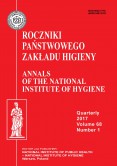Rocz Panstw Zakl Hig 2004, 55(1): 63-73
Ocena wyżywienia w domach pomocy społecznej w Warszawie na podstawie opinii pensjonariuszy
[Nutrition in Warsaw nursing homes in opinion of their residents]
STRESZCZENIE
Celem badań było poznanie opinii mieszkańców DPS na temat jakości posiłków i organizacji wyżywienia, z uwzględnieniem warunków otoczenia w jadalniach (wystroju pomieszczenia, atmosfery, itp.). Ponadto zebrano informacje dotyczące samooceny stanu zdrowia, kondycji psychicznej, aktywności fizycznej, apetytu oraz zwyczajów żywieniowych badanych pensjonariuszy. Większość badanych stanowiły samotne kobiety, głównie z wykształceniem średnim/zawodowym, mieszkające w DPS ponad 3 lata. Niezależnie od wieku i płci, najwięcej pensjonariuszy określało stan swojego zdrowia jako średni lub zły. Co druga osoba, jako przyczyny zamieszkania w DPS podawała względy zdrowotne oraz poczucie osamotnienia i izolacji w domu rodzinnym. Co trzecia osoba, po zamieszkaniu w DPS nadal odczuwała przygnębienie lub osamotnienie. Aktywność fizyczna i intelektualna badanych osób starszych zależała od samooceny stanu zdrowia. Ponad połowa badanych określiła swój apetyt jako dobry i stwierdziła, że ich masa ciała w czasie pobytu w DPS nie uległa zmianie. Wykazano istotny statystycznie związek samooceny zmian masy ciała z wiekiem oraz płcią. Zaobserwowano współzależność pomiędzy kondycją psychiczną, a odczuwanym apetytem oraz kondycją psychiczną, a zmianą masy ciała seniora podczas pobytu w DPS. Większość badanych pensjonariuszy (85%) stwierdziła, że bardzo podoba się im wygląd jadalni jako pomieszczenia do spożywania posiłków i nic nie należy w nich zmieniać. Znacznie więcej kobiet niż mężczyzn uważało, że jadalnie są przestronne, czyste i estetycznie urządzone, i różnice te były statystycznie istotne. Pewne zastrzeżenia wśród części pensjonariuszy budziła atmosfera panująca w jadalni w czasie spożywania posiłków, głównie ze względu na zbyt duży hałas. W opinii większości pensjonariuszy (ponad 80% respondentów) organizacja wyżywienia w DPS była dobra. Ponad połowa badanych oceniła jakość posiłków w DPS jako dobrą. Uwagi dotyczyły jedynie niedostatecznego udziału ilościowego owoców i warzyw w dziennym jadłospisie oraz małego urozmaicenia posiłków.
ABSTRACT
The aim of the study was to meet the opinions of NHs’ residents about the meals quality and nutrition system, with special consideration of meal ambience in canteens (appearance, atmosphere, etc.). Besides, other information about residents was collected: their self-perceived health status, psychical condition, physical activity, appetite and nutritional habits. Most of the subjects were single women, mainly with medium/technical education level, living in NHs over 3 years. Most of the NHs’ residents evaluated their health status as average or bad, independently of the age or gender. Every second person indicated that health, loneliness and the feeling of isolation in their homes were the main reasons for coming to NH. Every third person still felt the loneliness or depression after staying in NH. The physical and intelectual activity of elderly depended on self-perceived health status. Over half of the subjects assessed their appetite as good, and said that their body mass was stable during staying in NH. The statistically significant relationship was found between the self-evaluated weight change and both age and gender. Additionally, the relationship was observed between psychical condition of residents and their appetite as also between the psychical condition and weight change during living in NH. The majority of the subjects (85%) said that they liked the canteen appearance, and they did not want to change anything in it. More women than men thought that canteens were spacious, clean and furnished with good taste, and those differences were significant. Part of studied population (25%) had some reservations about the atmosphere in canteen during the meals, mostly because of too much noise. In the opinions of most of the residents (over 80%) the nutrition organisation in NHs was good. Over half of the subjects assessed the meals quality in NHs also as good. Only some comments were about insufficient quantities of fruits and vegetables and meal monotony.
Downloads: 5304


